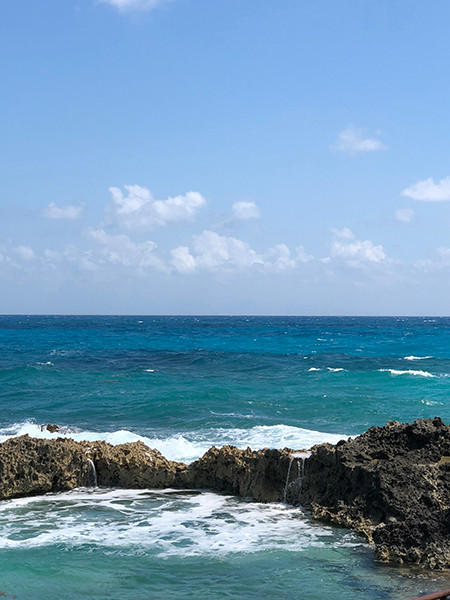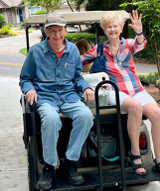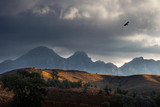I Still Exist
CHAPTER SIX “I Still Exist”
“Get yourself some girlfriends,” Max said. “That’s all I got to say. We did everything, I mean everything together, and now he’s gone.” I was at my first College Board Advanced Placement reading—scoring thousands of student essays from that year’s AP Literature Exam. Sitting by herself, smoking and writing, was this beautiful petite woman who looked so sad. I sat next to her and lit my own cigarette. We traded stories and I found out that her husband had died suddenly. She was alone. I thought, “This is so terrible. I can never lose Kent. It could never happen to me.”
When Kent died in 2012, that conversation with Max came back to me. Ten years later, I still remembered the sorrow in her eyes. But I also remembered the next iterations of Max. Every year we’d meet to grade essays during the day and share stories at night, and every year she became more whole. How long would it take for me to do that? The Thanksgiving day they carried his body down the stairs in a black bag I had no conception of myself as anything other than Lisa-without-Kent. The first sentence of this paragraph was originally, “When I did lose Kent in 2012, that conversation with Max came back to me.” I hate all of the euphemisms for death. I didn’t lose Kent; he died. I know exactly where his remains are.
I have never gone to visit his ashes tucked away in a fancy drawer of the mausoleum. They gave me a swipe card so I could enter the building whenever I wanted. His sister goes sometimes. He isn’t really there, though. So I don’t go. Where I feel closest to him is in the ocean. He loved boats and islands and snorkeling and salt-water tans. Together, we swam with seals in the Pacific of Ecuador. We swam topless in the Atlantic blues of Bandol, France. We plunged into the Sea of Cortez and tried to swim out to the dolphins. We soaked in the hot springs of San Miguel de Allende and Ouray, Colorado. We water-taxied around Venice. We lit up our own pool with floating candles for night swimming. The list goes on. I don’t pray, but when I am near the ocean I am as close to Kent and to our memories as I can be. That’s how I got to The Island of Women.
My Spanish varies between Spanglish and incomprehensible, but I try now and again to learn the language. Like many of my ventures since Kent died, it’s half-hearted. Back when I took a course in Arizona, it was better than it is now. It’s all about practice and desire. What isn’t? We would drive down across the border to Mexico through Lukeville, deep into the Sonoran Desert. I do not know what it is like now, but back in the early 1990’s there weren’t many English speakers in many of the little shops we would hit along the way to Puerto Peñasco. I would do my best, but some of the older shopkeepers wouldn’t talk to a woman. Machismo at its finest. I taught Kent to point to me and say, “Ella habla por mí” and only then would the old men sell me cold beer and spicy chips.
It was only four hours from Scottsdale to the Gulf of California, and I cannot count how many times we made the trip. The whales come around Baja California’s Pacific coast and up into the narrows of the Sea of Cortez (or Gulf of California). We would stand in the ocean watching them, letting the waves soak us with the moment. Sunsets and sand and shrimp. Leisurely kisses and long walks. Dolphins would greet us for breakfasts of huevos rancheros y camarones. Kent could eat shrimp for breakfast, lunch and dinner. We usually stopped by the fishermen’s market on the way out of town and filled up a cooler with shrimp and clams. Only once during our Sonoran drives do I remember him getting “shrimped out.” That time, we filled the cooler with Tecate beer instead.
I haven’t been back to Sonora, Mexico or to Arizona. We lived there for twelve years and began our life together there. I sometimes think that if I did go back to the desert it would finish me somehow, some little grief box would get checked off. But I haven’t been back. He isn’t there. We aren’t there. Geographical places are strange like that. Our time there was magical, and it’s all still in my mind. Would anything change if I physically went back? Would some remedy blow through me from the desert winds at sunset? Would hearing a coyote howl soften my heart? I could go during monsoon season and laugh at how we watched golf-ball sized hail plunk into the pool. Or I could watch the lightening dance horizontally across the sky and remember how we ached for storms.
But my heartache isn’t in a microburst of dust or a western sky sunset with more colors than can be counted. It’s in me, in my head. Going someplace old or new isn’t going to fix anything. But it does change us. What did Mark Twain say? “Travel is fatal to prejudice, bigotry, and narrow-mindedness.” Travel can also help heal. So when I could finally leave the house on my own I decided to look for Kent in the ocean. I wanted a place we had not been to together. I wanted an ocean place where I could sit alone with my mind and my heart and see what it was they wanted. I found it on a little five-mile long island between the Gulf of Mexico and the Mexican Caribbean—Isla Mujeres (Island of Women).
I wanted a place by the ocean, a place in our favorite other country—Mexico. I knew, however, that I needed a place we had never been to together. I don’t remember how I stumbled on Isla Mujeres, but I do remember that my mind was still so frozen, so stilted that I screwed up the flights. The first time I make my own travel plans and I fail. That cheaper flight from New York to Cancun wasn’t just a red-eye. It was a ten-hour layover in Philadelphia. How could I have missed that? How could I be so stupid? The brain does what it can to help us, but when grief and depressions strike, neurogenesis slows down. Tasks that were once second nature take a great deal of thought. How could I be this dumb? My brain was exhausted with grief.
I decided to slow down, and try and think things through more carefully. It didn’t always work, but at least I knew I couldn’t trust my mind the way I used to, not yet. I got to Cancun eventually, found the pre-booked airport shuttle (score one point for the brain), and made it to the ferry. A twenty-minute ride across the bluest water I had seen since St. Croix, and I was invigorated. I can do new things. I still exist.
I walked into Mother Ocean through the soft sand. I cried as I felt her waves hug me. I swear I could feel Kent’s presence; not in a weird ghostly way, but in a way that I felt his energy all around me. I cried a lot that first trip, but it was a good, cathartic crying, the kind that makes you feel as if the skin of your soul is peeling off.
ABOUT THE AUTHOR-------
Lisa St. John is a high school English Teacher and published poet. Her newest endeavors include a memoir in progress and poetry. Her first chapbook, Ponderings, can be purchased at Finishing Line Press. She lives in the beautiful Hudson Valley of upstate New York where she calls the Catskill Mountains home. Lisa has published her poetry in the Barbaric Yawp, Bear Creek Haiku, Misfit Magazine, The Poet’s Billow PKA’s Advocate, Haight Ashbury Literary Journal, The Ekphrastic Review, Albany Poets, Eyedrum Periodically, Light, and Chronogram Magazine. The poem “There Must Be a Science to This” won The Poet’s Billow’s Bermuda Triangle Contest and “Mowing the Lawn” was shortlisted for the Fish Poetry Prize and later published in Fish Anthology 2016. "Particle Song" was a finalist for the 2017 Rash Award in Poetry by Broad River Review. Her poem “The Whens of Now” was selected as a finalist for the New Millennium Writings 44th Literary Awards. Lisa also writes two blogs, Random Mind Movements and Widows’ Words. They can be found on her website at lisachristinastjohn.com




